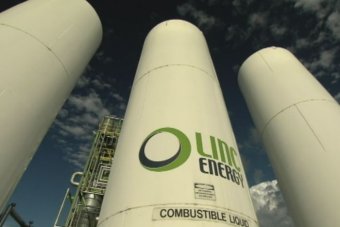The Queensland Government has widened its legal action against resources company Linc Energy over the alleged contamination of the environment by its underground gas plant on the Darling Downs in the state’s south-east.
The Government has today filed a fifth charge of wilfully and unlawfully causing serious environmental harm against the company.
An investigation — the largest and most protracted in the history of the Queensland Environment Department — has found that Linc Energy’s Underground Coal Gasification (UCG) plant at Hopeland caused irreversible damage “to more than one environmental receptor [which includes the atmosphere, vegetation, water and soil]”.
UCG is a so-called “unconventional” means of extracting gas from coal seams that are too deep to mine.
Coal is burned in situ underground and the gas produced is siphoned off through wells.
The ABC has been told that external experts contracted by the department found “scientific evidence of [the plant’s] operation above hydrostatic pressure, fracturing the landform, and excursion of contaminants”.
“[The department’s] detailed investigation alleges Linc Energy operated its trial Underground Coal Gasification plant outside its Environmental Authority, causing contamination in the form of gas to escape off site,” Environment Department director-general Jon Black said.
“These fugitive gases polluted a widespread area by following underground pathways, between two and six metres underground.
“The polluting gases included carbon monoxide, hydrogen and hydrogen sulphide.”
Queensland’s Environment Minister Steven Miles is travelling to the western Darling Downs to meet with affected landholders and to explain what the latest charge means.
“This is probably the biggest investigation of its kind in Australian history, we’ve had upwards of 100 technical officers in Chinchilla monitoring sites and measuring this pollution, it’s a very serious matter,” he said.
“Our next biggest concern is the impact that this pollution could have on the livelihoods and on the wellbeing of the landholders in the area nearby Linc.
“We’re talking about approximately 320 square kilometres which has been the subject of an exclusion zone put in place for some time now.”
In March, the ABC revealed that the department’s investigation backed claims by former workers at Linc’s UCG plant that they have suffered ill health as a result of a series of “uncontrolled releases” of gas at the site between 2007 and 2013.
A medical expert commissioned by the department reviewed workers’ statements and medical records and found that “the symptoms presented are consistent with exposure to the known chemical constituents of syngas [produced at the plant]”.
Since launching its investigation, the department’s investigators have interviewed more than 100 previous and current Linc employees and consultants engaged by the company.
Water and soil samples collected from 13 farms
More than 230 bores have been drilled on Hopeland properties to test for contaminant gases, with water and soil samples collected from 13 farms.
The department has also conducted flyovers using sophisticated aerial thermal imagery to test for “hot spots” signalling an underground fire.
Analysis has revealed that “[underground] combustion is no longer occurring”.
Micro-seismic technology has also been employed to see if gases are passing through underground fractures.
Lab tests have confirmed the presence of gases, including hydrogen gas which presented “an explosive risk associated with conducting excavation works”.
Farmers at Hopeland have been told not to dig deeper than two metres unless they first contact the department.
Sources have told the ABC that any environmental rehabilitation of the area would present enormous challenges, with no known precedents for remediation of gas contamination of this type.
The latest complaint of serious environmental harm against Linc Energy was lodged in the Dalby Magistrates Court. The four other charges were filed last year.
Environment Department Director-General Jon Black said the penalty for each charge is up to five years jail or a fine of up to $6.5 million.
Linc Energy has told the ABC it will defend itself against the charges, accusing the Environment Department of running a substandard investigation.
“The investigation has been conducted in a piecemeal manner in which EHP has sought to gather evidence on the run, which has reinforced our view that there was insufficient evidence to lay the initial charges in the first place,” a Linc Energy spokesman said.
“Both the minister and the director-general have refused to meet with Linc despite numerous requests to discuss the manner in which the proceedings have been conducted, and haphazard manner in which the regional investigation was conducted.”

